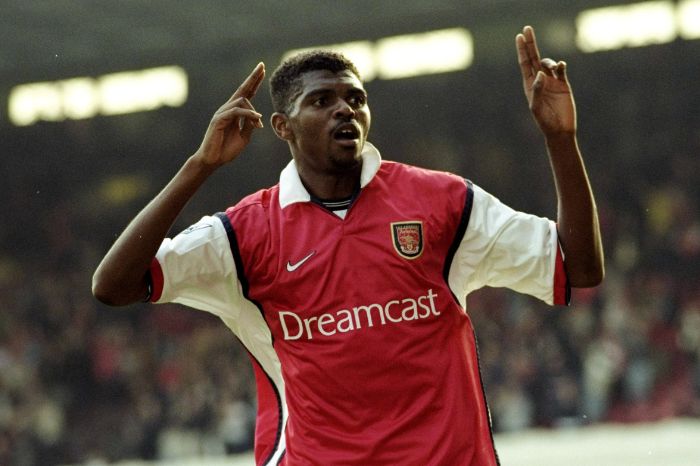By Emmanuel Etim
Follow @Emiearth on X for more expert analysis.
Walking through Nigeria’s bustling streets, you’ll often notice a board on nearly every corner each one etched with inscriptions detailing fixtures of what was to come – The English Premier League.
The passion many Nigerians have for the EPL is hardly surprising. Over the years, the league has delivered consistent high-quality content, always within reach. Like a steaming plate of Jollof rice – a Nigerian favourite – consumption is rapid. Beyond easy access to club information, the presence of Nigerian players in the league since its reformation in 1992 has been instrumental. Their exploits continue to fuel the frenzy surrounding what many consider the “best league in the world.”
For decades, the number of Nigerian players in the EPL has continued to grow. In fact, since 1992, there has always been at least one footballer proudly singing Arise, O Compatriots’ with a flag colored green and white in the EPL.
Efangwu Goziem Ekoku, a trailblazer—if that label fits best—was born in Cheetham Hill, Manchester. In the 1992–93 season, under manager Mike Walker, he joined Norwich City for £500,000. Ekoku arrived at Carrow Road when the Canneries were in the thick of the title race, scoring three goals in ten games in what was left of that exciting campaign. Though Norwich ultimately lost out to Manchester United, they secured a third-place finish and a historic UEFA Cup qualification. Ekoku was also part of the victorious Super Eagles squad that won the Africa Cup of Nations in 1994.
Nigeria’s AFCON triumph and maiden World Cup appearance in 1994 amplified how much quality was inherent in the squad. Among its standout talents was The Bull—Daniel Owefin Amokachi. Born in Kaduna, he was discovered while playing for Ranchers Bees before moving to Club Brugge in Belgium, where he became the first player to score in the previous format of the UEFA Champions League. His impressive World Cup performances attracted interest from the blue half of Merseyside, leading Everton manager Walker—who had signed Ekoku for Norwich two years earlier—to secure his services for £3,000,000. Amokachi later etched his name into Everton folklore, winning the FA Cup in 1995 and famously scoring twice in the semi-final against Spurs after ‘substituting himself’ in the match while Paul Rideout received treatment. Still incredible this this second.
Then came the era of Celestine Hycieth Babayaro, one of the finest left-backs to grace the beautiful game—almost flawless in his craft. Babayaro spent the majority of his career in the Premier League, primarily with Chelsea, who signed him for £2.25 million in 1997. He remained at Stamford Bridge until 2005 before moving on to Newcastle United, where he played until 2008. During his time at Chelsea, Cele won the UEFA Cup Winners’ Cup and Super Cup in 1998, as well as the FA Cup during the 1999–2000 season.
"They conceded quite a few chances but their guests had an off day in front of goal" ?@PoojaMedia gives us his best picks for this weekend! ??
— Bet9ja: The home of #betBOOM! ? (@Bet9jaOfficial) February 28, 2025
Highbury was another destination which housed a Nigerian talent. In February 1999, after just twelve games and one goal for Inter Milan, Kanu Nwankwo joined Arsenal for approximately £4.15 million. The rest, as they say, is history. The Imo-born forward went on to become one of Africa’s most decorated footballers. Pinpointing his most glorious moment is nearly impossible, as every time he stepped onto the pitch, fans witnessed something special. However, if one had to choose, his legendary hat-trick in fifteen minutes against Chelsea during the 1999–2000 season—turning a 2–0 deficit into a 3–2 victory—stands out as unforgettable. Kanu’s time at Arsenal deepened Nigeria’s love affair with the Premier League, with more vociferous recruits for the Gunners. He later played for West Bromwich Albion and Portsmouth, where he secured his third FA Cup winner’s medal.
Widely regarded as one of the most naturally gifted players of all time, Augustine Azuka “Jay-Jay” Okocha dazzled like no other in the Premier League. Truly he was Fans immortalized his brilliance with shirts bearing the inscription: “Jay-Jay – so good they named him twice.” The inscription on shirts each matchday. In the summer of 2002, Okocha joined Bolton Wanderers on a free transfer after leaving PSG. His arrival transformed the club beyond expectations, making Bolton a household name in Nigeria.
At the mere mention of Yakubu Ayegbeni, defenders trembled. Born in Benin City, this ancient city gifted us a modern-day goal predator. His standout performances in the 2002–03 UEFA Champions League campaign for Maccabi Haifa earned him a loan move to Portsmouth, which became permanent after the club secured Premier League promotion in 2003. Nicknamed “The Yak” by fans, he went on to make over 250 Premier League appearances for Pompey, Middlesbrough, Everton, and Blackburn Rovers scoring 96 goals.
Ever wondered what highly sought-after looks like in human form? Look no further than John Michael Nchekwube Obinna. Born in Jos, the former Plateau United midfielder moved to Norwegian club Lyn at just 17 in 2004. Two years later, he made a career-defining decision—choosing Stamford Bridge over Old Trafford. At Chelsea, where he spent over a decade, Mikel was more than just a signing; he became an integral part of the club’s dominance under The Special One. One of Nigeria’s most decorated footballers, he amassed an impressive collection of silverware, including two Premier League titles, three FA Cups, one League Cup, one Community Shield, and two European crowns—the UEFA Champions League and Europa League. A true superstar, Mikel left his mark not just in Chelsea blue but also in Nigeria’s iconic green and white. Today the fans have a taste of him in a different mode – with the ObiOne Podcast.
Another worthy of mention is Joseph Michael Yobo, who at a fee of £1 million became David Moyes’ first signing at Everton. Yobo quickly established himself as one of the most consistent players in the squad, playing every minute of the 2006–07 season—one of only seven players in the Premier League achieve the milestone. He also served as the captain of the Nigerian national team until his retirement in June 2014.
There are many others who have contributed to the Premier League’s popularity in Nigeria, including Danny Shittu, Victor Moses, Seyi Olofinjana, Isaac Success, John Utaka, Peter Odemwingie, Odion Ighalo, Shola Ameobi, Julius Aghahowa, and Kelechi Iheanacho.
The new ‘boys on the block’ – Wilfred Ndidi, Calvin Bassey, Alex Iwobi, Ola Aina, and Taiwo Awoniyi, continue to keep the allure of England’s top flight strong, appealing not only to professional players but also to the everyday fan who happily pays N50 to watch their favorite EPL team at a viewing center.
The question, however, is whether there will ever be another Nigerian player in the Premier League who can surpass Kanu’s exquisite style of play, Mikel’s composure, score more goals than The Yak, and bring the same excitement as Emperor Austin Jay-Jay Okocha.



